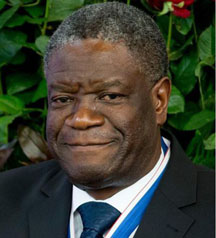Dr. Denis Mukwege was in surgery when he heard that he had won the Nobel Peace Prize along with Yazidi activist Nadia Murad for their efforts to end the use of sexual violence as a weapon of war. (Yazidis belong to a religious minority group based in the Middle East). The Norwegian Nobel Committee said the two winners "have made a crucial contribution to focusing attention on, and combating, such war crimes."
The Committee awarded Mukwege for his treatment of 50,000 survivors of sexual violence. His direct journey towards the prize started when he returned to the homeland after obstetrician training in France. The first patient he treated was a rape survivor and the experience allowed him to see rape as a weapon of war.
In 2012, Mukwege and his family survived an attempted kidnapping and murder. The stayed away from the Congo, but returned home in three months. Today, UN peacekeepers provide him protection.
Dr. Denis Mukwege Gets Nobel Peace Prize

Today, UN peacekeepers provide Dr. Mukwege protection.
When she was 21, terrorists attacked Murad’s village in northern Iraq, and she was forced into sexual slavery. Her belief system, Yazidism, is monotheistic and combines aspects of several monotheistic religions including Zoroastrianism, Islam, Christianity and Judaism. However, ISIS targets them in its efforts to rid areas of "non-Islamic" influences.
Jonsaba Jonsy Jaiteh, a survivor of female genital mutilation and child marriage, says the Nobel announcement pleases her. "I saw it and I find it very brilliant and encouraging" commented the Gambian who penned "Breaking the Culture of Silence" for Port Of Harlem. Today, she achieving her life-long goal: to finish high school.
The U.S. Senate confirmation of Bret Kavanaugh as a US Supreme Court judge, despite the allegations that he used sexual assault for his amusement and a robust investigation into the charges, overshadowed The Nobel Committee’s announcement. The 2018 prize is worth about $1.01 million.
Jonsaba Jonsy Jaiteh, a survivor of female genital mutilation and child marriage, says the Nobel announcement pleases her. "I saw it and I find it very brilliant and encouraging" commented the Gambian who penned "Breaking the Culture of Silence" for Port Of Harlem. Today, she achieving her life-long goal: to finish high school.
The U.S. Senate confirmation of Bret Kavanaugh as a US Supreme Court judge, despite the allegations that he used sexual assault for his amusement and a robust investigation into the charges, overshadowed The Nobel Committee’s announcement. The 2018 prize is worth about $1.01 million.
Advertisers | Contact Us | Events | Links | Media Kit | Our Company | Payments Pier
Press Room | Print Cover Stories Archives | Electronic Issues and Talk Radio Archives | Writer's Guidelines






